Mediterranean Diet Meal Plan: Why Timing Your Meals Changes Everything (And Most People Get It Wrong)
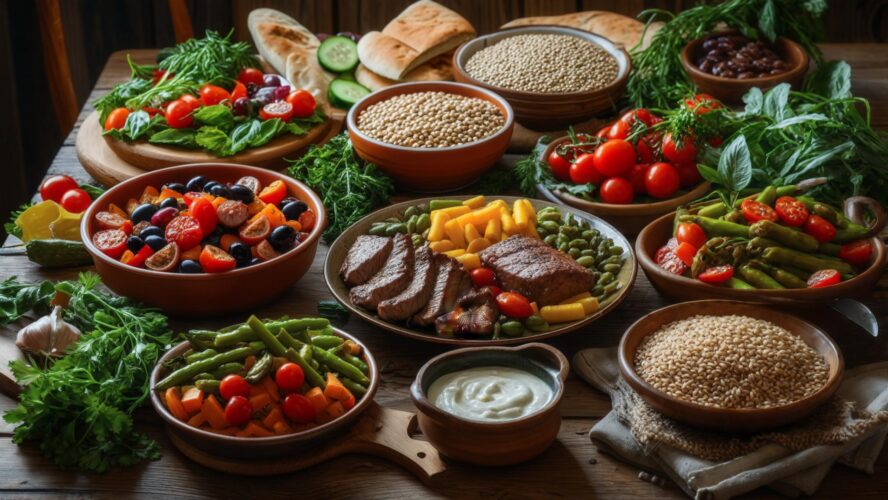
The Mediterranean diet has captured global attention for its remarkable health benefits, but most meal plans miss the crucial timing element that traditional cultures naturally followed. Look, I used to think I could just copy Greek recipes and call it Mediterranean eating. Spoiler alert: that didn’t work. While many focus solely on ingredient lists and recipes, the real secret lies in understanding when and how your body best processes these nutrient-dense foods throughout the day.

Table of Contents
- The Real Secret Behind Mediterranean Longevity (It’s Not Just What You Eat)
- Finding Your Food’s True Home: Why Location Matters More Than You Think
- Your Genetic Blueprint: Customizing the Mediterranean Way for Your Body
- From Overwhelmed to Expert: The Step-by-Step Meal Plan Mastery System
TL;DR
- Your body processes Mediterranean foods differently throughout the day – eating your biggest meal at midday when digestive enzymes peak can dramatically improve nutrient absorption (though I know this sounds impossible with a 9-to-5 job)
- The Mediterranean diet works best when you adapt it to your local environment and what actually grows near you, rather than copying recipes from Greece and spending a fortune on imports
- Your genetics determine how you respond to olive oil, wine, and other Mediterranean staples – one size definitely doesn’t fit all (and that’s totally okay)
- Starting simple with three daily swaps beats jumping into complex meal plans that you’ll abandon within weeks (trust me, I’ve been there)
- Seasonal eating isn’t just trendy – it matches your body’s changing metabolic needs throughout the year
The Real Secret Behind Mediterranean Longevity (It’s Not Just What You Eat)
Most Mediterranean diet meal plans completely miss the timing element that people in Mediterranean countries just naturally followed. What I’ve learned (sometimes the hard way) is that when you eat matters just as much as what you eat. Your body’s ability to process nutrients fluctuates dramatically throughout the day based on hormonal cycles and enzyme production.
People in Mediterranean countries instinctively ate their largest meal midday when their digestive system was strongest. They shifted their eating patterns with the seasons to match their body’s changing needs. This approach goes beyond simple meal planning to create an eating schedule that works with your body while honoring what people have done for generations.
The Mediterranean diet meal plan that actually works requires understanding these natural rhythms. I’ve seen people transform their health simply by moving their heaviest Mediterranean meal to midday instead of evening. Your digestive system operates on predictable patterns that most Mediterranean diet meal plans completely ignore.
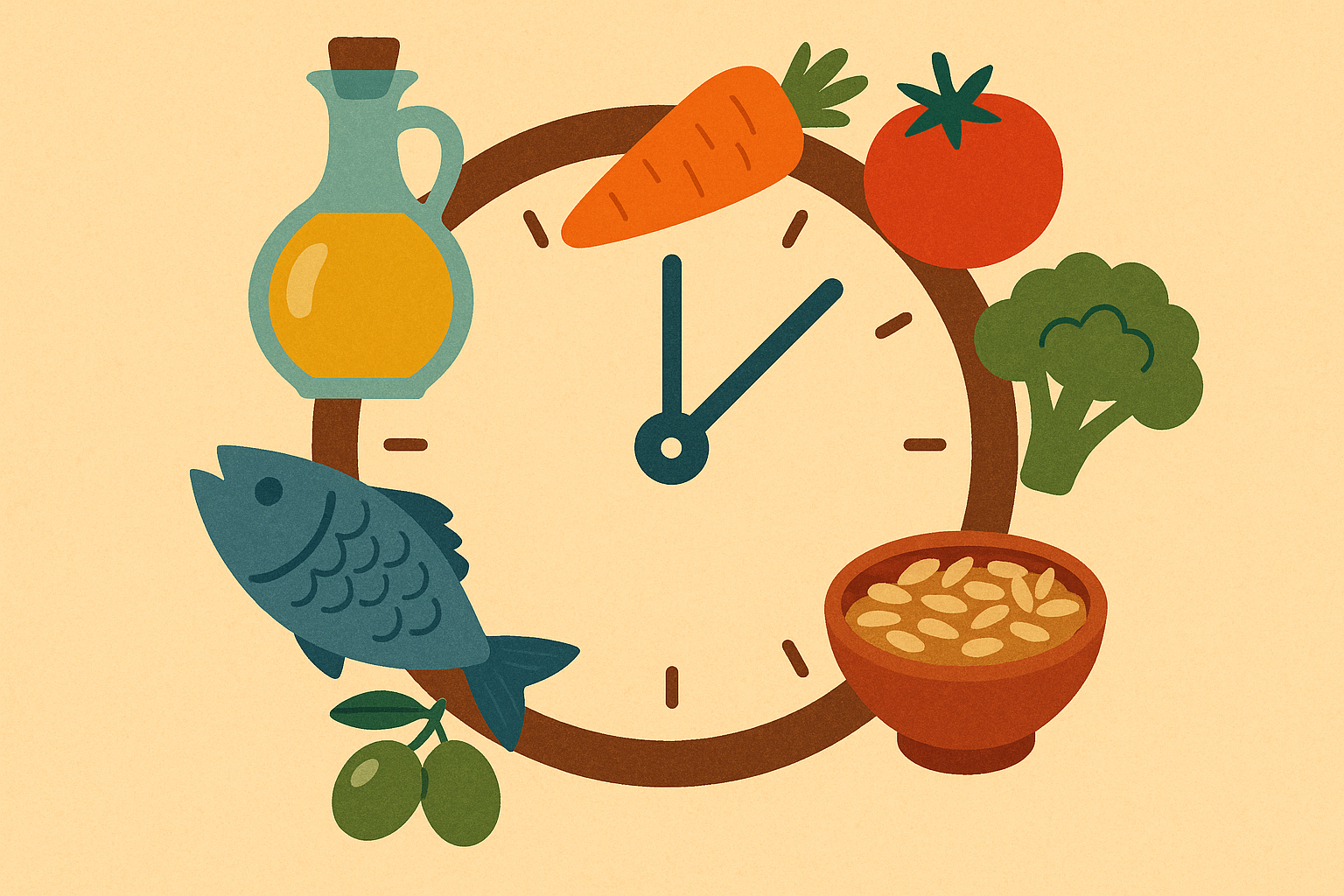
Syncing Your Meals with Your Body’s Natural Clock
Your digestive system operates on a predictable rhythm that most people completely ignore. I get it – who thinks about enzyme production when you’re grabbing lunch between meetings? But cortisol levels, enzyme production, and metabolic rate all fluctuate in patterns that can either work for you or against you. Mediterranean cultures developed eating patterns that naturally aligned with these biological rhythms, which explains part of their remarkable health outcomes.
Understanding how to time your meals right means you can extract maximum nutrition from every bite while supporting your body’s natural repair cycles. The Mediterranean diet becomes exponentially more effective when you time your meals correctly. I’ve watched people double their energy levels simply by restructuring when they eat their Mediterranean foods.
Your body produces different enzymes at different times of day. This affects how well you absorb the nutrients from your Mediterranean diet. Ignoring these patterns means you’re leaving benefits on the table.
| Time Period | Digestive Capacity | Optimal Mediterranean Foods | Key Benefits |
|---|---|---|---|
| 6-10 AM | Gentle awakening | Olive oil, whole grains, yogurt | Cortisol regulation, enzyme activation |
| 12-3 PM | Peak efficiency | Legumes, fish, complex meals | Maximum nutrient absorption |
| 6-8 PM | Winding down | Vegetables, light proteins | Overnight repair support |
Morning: Waking Up Your Metabolism (6-10 AM)
Your morning routine sets the tone for your entire day. Look, I used to be that person rushing out the door with coffee and whatever I could grab. I’ve been there. During these early hours, your body needs foods that support hormone regulation and gently prepare your digestive system for the day ahead. I’ve found that starting with warm lemon water infused with Mediterranean herbs helps activate digestive enzymes.
Following this with olive oil-drizzled whole grain bread topped with fresh tomatoes and sea salt provides the perfect balance of healthy fats and complex carbohydrates. Adding protein-rich Greek yogurt with nuts stabilizes blood sugar and prevents the mid-morning energy crash that derails so many people’s eating plans.
Maria, a busy marketing executive, transformed her mornings by replacing her usual coffee and pastry with warm lemon-rosemary water followed by Greek yogurt topped with walnuts and honey. Within two weeks, she noticed sustained energy until lunch and eliminated her 10 AM sugar cravings completely. Her Mediterranean morning routine became the foundation for her entire day’s success.
Midday: Your Digestive Powerhouse Hours (12-3 PM)
This is when your body becomes a nutrient-absorbing machine. The timing thing confused me at first too – who has time to eat their biggest meal at lunch when you work a 9-to-5? But your digestive enzymes reach their highest production levels during these hours, making this the optimal time for your most complex and largest meal of the day. I center these meals around legume-grain combinations – lentils with bulgur or chickpeas with barley provide complete proteins while being easier to digest than heavy meats.
If you drink red wine, this is when your body can best utilize those beneficial compounds. Save your heaviest proteins for this window when your body can actually break them down efficiently. The Mediterranean diet works best when you respect these natural digestive rhythms.
Your midday Mediterranean meal should be substantial and satisfying. This prevents evening overeating and supports better sleep quality. I’ve seen people lose weight simply by shifting their largest Mediterranean meal to this optimal time window.
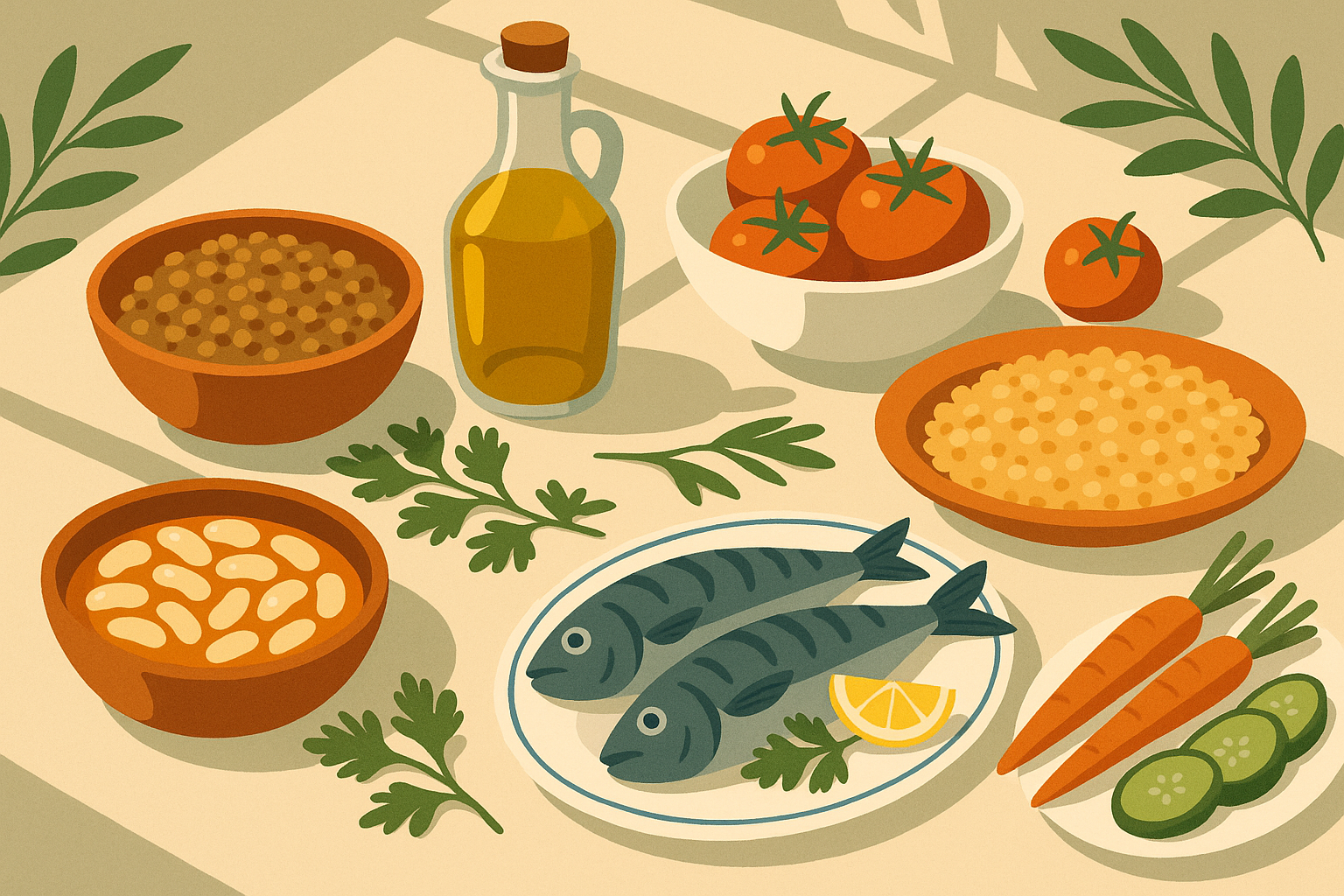
The Mediterranean approach to midday eating emphasizes taking your time. Actually sitting down and chewing your food during these peak digestive hours maximizes nutrient extraction. Your body rewards this attention with better energy and fewer digestive issues.
Evening: Preparing for Overnight Repair (6-8 PM)
Your evening meal should support overnight cellular repair without taxing your digestive system. I focus on vegetable-based dishes that don’t require much processing during these hours. Foods rich in magnesium provide essential minerals and support sleep quality.
The key is ending your eating at least three hours before bedtime to optimize the benefits of overnight fasting. Your body needs this time to shift from digestion to repair mode. Mediterranean cultures understood this instinctively, which contributed to their remarkable longevity.
Eating with the Seasons (Your Ancestors Did This for Good Reason)
Traditional Mediterranean eating patterns shifted dramatically with seasons, and it wasn’t just about food availability. Your body’s metabolic needs actually change throughout the year, and seasonal eating helps you stay in sync with these natural rhythms.
Spring calls for detoxification with bitter greens. Summer demands hydration through water-rich foods. Autumn requires preparation with healthy fats and warming spices. This seasonal approach keeps your metabolism flexible and responsive rather than stuck in one pattern year-round.
The Mediterranean diet adapts beautifully to seasonal changes when you understand the underlying principles. I’ve found that people who embrace seasonal Mediterranean eating report better energy, fewer cravings, and improved mood throughout the year. Your body craves different Mediterranean foods at different times of year for biological reasons.

Winter Mediterranean eating emphasizes warming foods and healthy fats to support your body’s increased energy needs. Spring Mediterranean foods focus on cleansing and renewal after winter’s heavier fare. Summer Mediterranean meals prioritize hydration and cooling foods. Fall Mediterranean eating prepares your body for the coming winter months.
Timing Your Nutrients for Maximum Impact
Certain Mediterranean nutrients are absorbed more effectively when consumed at specific times – something modern meal plans completely overlook. Fat-soluble vitamins need to be paired with healthy fats and consumed when your bile production is highest.
Competing minerals should be separated to prevent absorption interference. Antioxidant-rich foods work best when timed with your body’s natural antioxidant enzyme production cycles. Getting this timing right can literally double the nutritional value you extract from the same Mediterranean foods.
The Mediterranean diet becomes a precision nutrition system when you understand these timing principles. I’ve helped people resolve nutrient deficiencies simply by restructuring when they consume specific Mediterranean foods throughout the day.
Finding Your Food’s True Home: Why Location Matters More Than You Think
Generic Mediterranean diet meal plans ignore a crucial truth: the Mediterranean diet’s success comes from eating foods grown in specific soil conditions and climates. Simply copying recipes from Greece won’t give you the same results if you’re eating foods grown in depleted soil thousands of miles away. I used to be that person buying expensive imported everything, thinking it made me more Mediterranean. My wallet disagreed.
I’ve learned that understanding what grows well in your area and adapting Mediterranean principles accordingly creates a more sustainable and effective eating pattern. This approach recognizes that the mineral content of your soil, your local growing seasons, and even your cultural eating rhythms all impact how well a Mediterranean-style diet works for you.
The best Mediterranean diet meal plan for you incorporates foods that thrive in your specific area. This isn’t about abandoning Mediterranean principles – it’s about finding local expressions of those same nutritional concepts. Your Mediterranean diet meal plan should reflect where you actually live, not where you wish you lived.
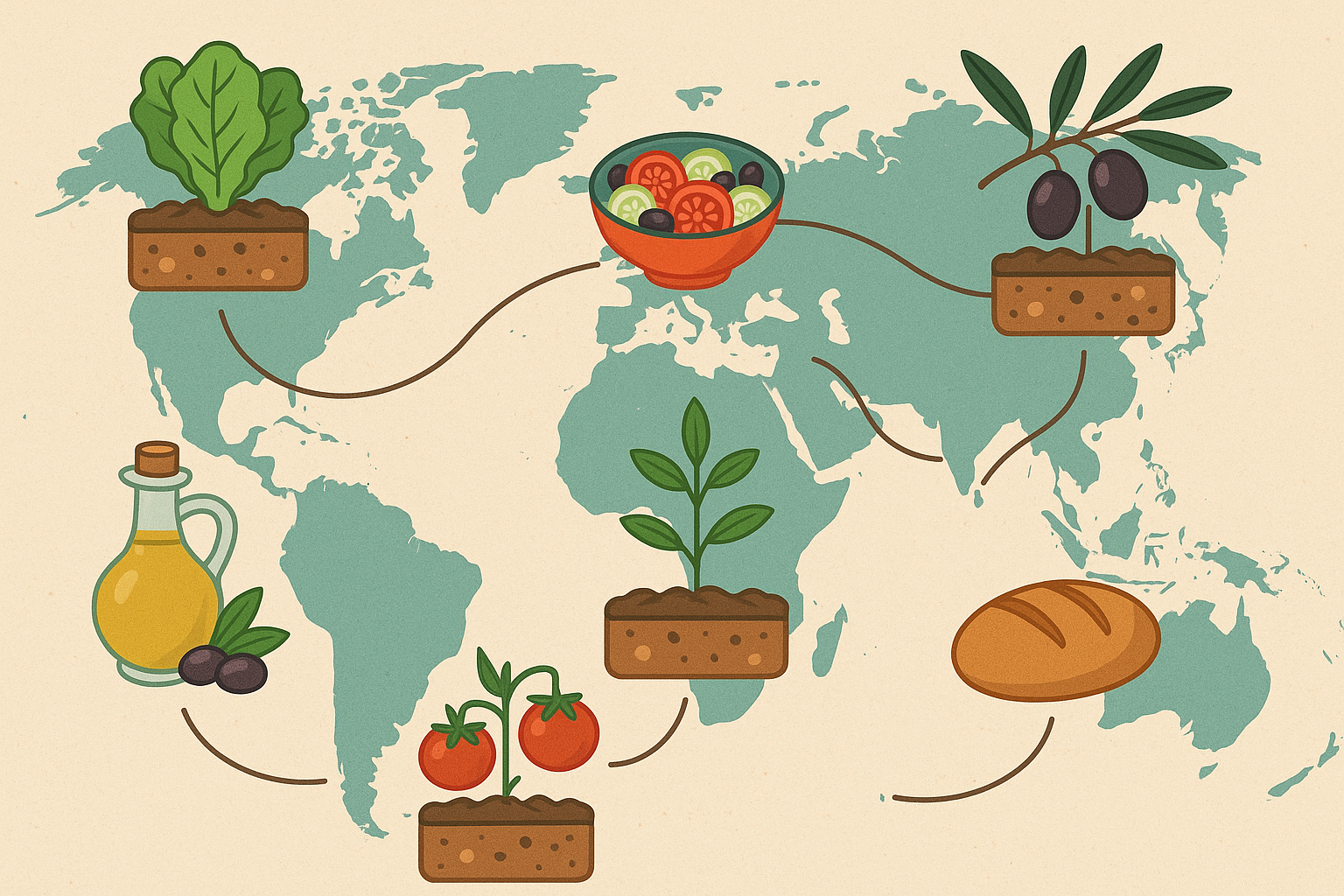
Creating an effective Mediterranean diet meal plan requires mapping your local food landscape against traditional Mediterranean principles. The Mediterranean diet works because it emphasizes foods that grow well in Mediterranean climates and soils. You need to find equivalent foods that thrive in your environment.
I’ve discovered that successful Mediterranean diet adaptation starts with understanding your local growing seasons. Your Mediterranean diet meal plan should emphasize foods when they’re naturally abundant in your area. This ensures maximum nutrient density while supporting local food systems.
The Mediterranean approach to eating can be adapted anywhere in the world when you understand the underlying principles. Your Mediterranean diet meal plan becomes more sustainable and effective when it works with your local environment rather than against it.
Mapping Your Local Food Landscape
The secret is identifying foods in your area that share similar nutritional profiles and growing conditions to traditional Mediterranean staples. This isn’t about giving up Mediterranean principles – it’s about finding local expressions of those same nutritional concepts.
Your local growing season might not match Mediterranean harvest cycles, but you can still find native plants with similar health-promoting compounds to Mediterranean herbs. Ancient grains that thrive in your specific climate will often provide better nutrition than imported varieties that lost nutrients during shipping and storage.
I spent way too much money on imported farro before realizing the spelt grown 20 miles from my house was basically the same thing. The most successful Mediterranean diet adaptations happen when people become students of their local food landscape. Understanding what grows well in your area and when helps you create a Mediterranean diet that actually works with your environment.
Smart Substitutions That Actually Work
I’ve discovered that successful Mediterranean diet adaptation requires mapping your local growing season against Mediterranean harvest cycles. This helps you identify when to emphasize certain foods for maximum nutritional benefit.
Native plants in your area might offer similar health compounds to traditional Mediterranean herbs – you just need to know what to look for. Sourcing locally grown ancient grains that thrive in your climate ensures you’re getting maximum nutrient density while supporting your local food system.
The Mediterranean diet becomes more accessible and sustainable when you find local alternatives to traditional ingredients. These substitutions often provide better nutrition than imported options because they’re fresher and grown in soil conditions that match your local environment.
| Mediterranean Staple | North American Alternative | Nutritional Match | Best Growing Season |
|---|---|---|---|
| Olive Oil | Cold-pressed sunflower oil | Vitamin E, healthy fats | Late summer |
| Oregano | Wild bergamot | Antioxidants, antimicrobial | Summer |
| Farro | Spelt or emmer wheat | Fiber, protein, minerals | Fall harvest |
| Capers | Pickled nasturtium buds | Quercetin, flavor compounds | Spring/summer |
Understanding Your Soil’s Nutritional Signature
Your local soil composition directly affects the mineral content of your food, and this matters more than most people realize. Getting your local soil tested reveals what minerals are abundant or lacking in your area. Foods grown in mineral-rich local soils will always outperform imported options that may have started with better soil but lost nutrients during transport.
Strategic supplementation based on what your local area lacks compared to Mediterranean regions can fill in the gaps. James discovered through soil testing that his Pacific Northwest region was selenium-deficient compared to Mediterranean soils. By incorporating locally-grown Brazil nuts and mushrooms (which concentrate selenium), he achieved better antioxidant status than when he was importing expensive Mediterranean supplements.
Understanding your soil’s nutritional signature helps you make smarter food choices within the Mediterranean framework. This knowledge transforms your Mediterranean eating from guesswork into precision nutrition.
Adapting Mediterranean Social Rhythms to Modern Life
The Mediterranean diet isn’t just about food – it’s about how you eat. The social and cultural aspects of Mediterranean eating contribute significantly to the health benefits, but you need to adapt these practices to fit modern schedules and lifestyles.
Creating contemporary versions of traditional Mediterranean social eating practices helps you maintain the stress-reducing and community-building aspects that make this way of eating sustainable long-term. The Mediterranean approach to meals emphasizes connection and mindfulness, which are just as important as the food itself.
I’ve found that people who successfully adopt Mediterranean eating patterns create their own versions of traditional social rituals. This might mean family dinners without phones, weekend cooking sessions with friends, or simply taking time to properly savor your Mediterranean meals instead of eating on the run.

The Mediterranean diet works best when it becomes a lifestyle rather than just a list of foods to eat. Incorporating the social and cultural elements makes your Mediterranean eating pattern more enjoyable and sustainable. Your Mediterranean diet becomes a source of pleasure and connection rather than restriction and stress.
Your Genetic Blueprint: Customizing the Mediterranean Way for Your Body
This is where Mediterranean meal planning gets really interesting. Ever wonder why you feel sluggish after trying to follow those picture-perfect Mediterranean meal plans while your friend thrives on the exact same foods? You’re probably fighting against your own genetics. Your body’s unique way of handling food determines how you should balance different types of fats.
How your body processes certain nutrients influences which Mediterranean foods will best support your genetic expression. Even your histamine tolerance and lectin sensitivity affect how you should prepare traditional Mediterranean staples. Understanding your body’s unique patterns allows you to customize the traditional Mediterranean framework for optimal personal results.
You know how your friend can eat tons of olive oil and feel great, but it gives you heartburn? That’s not in your head – your genes actually affect how you handle different foods. The Mediterranean diet isn’t one-size-fits-all, despite what most meal plans suggest. Your genetic makeup determines how you’ll respond to specific Mediterranean foods and eating patterns.
Your Mediterranean diet should be as unique as your DNA. Generic Mediterranean diet meal plans can’t account for your individual genetic variations, which is why personalization matters so much. The Mediterranean diet works best when it’s tailored to your specific genetic blueprint.
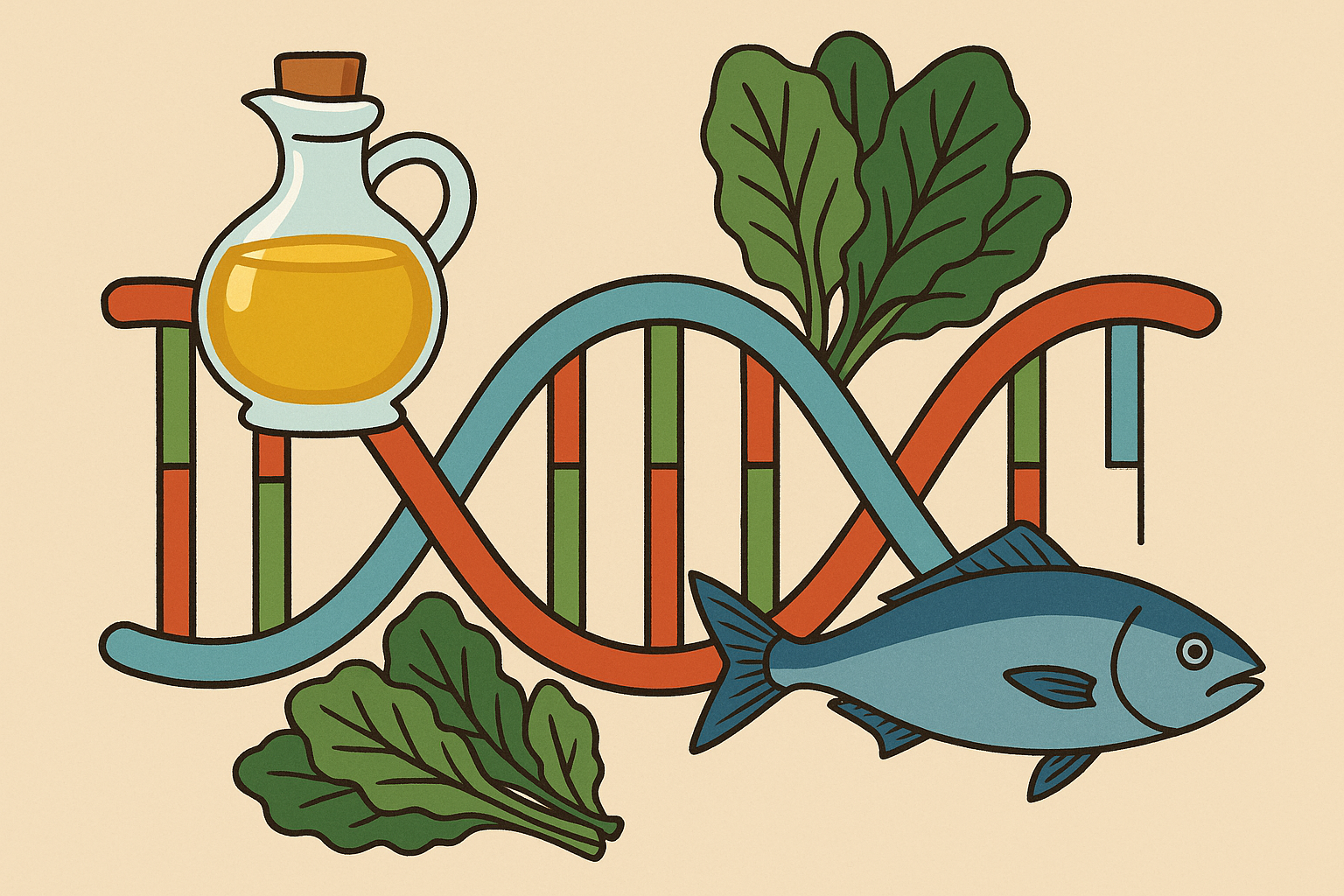
Understanding your genetic variations helps you optimize your Mediterranean diet for maximum benefit. This isn’t about making the Mediterranean diet complicated – it’s about making it work better for your specific body. Your Mediterranean eating pattern becomes more effective when it accounts for your genetic individuality.
Working with Your Genetic Expression
Certain Mediterranean foods can actually change how your genes work, literally turning beneficial genes on or off based on your individual genetic makeup. This isn’t science fiction – it’s practical nutrition that can dramatically improve your results.
Your genetic variant status affects how you should balance olive oil with other Mediterranean fats for optimal brain and heart benefits. Understanding how your body processes certain nutrients helps you emphasize the right Mediterranean foods rich in folate-rich leafy greens and legumes.
The Mediterranean diet becomes a personalized medicine approach when you understand how specific foods interact with your genes. I’ve worked with people who saw dramatic improvements in energy and mood once they aligned their Mediterranean eating with their genetic expression patterns.
Your genes don’t determine your destiny, but they do influence how you respond to different Mediterranean foods. Working with your genetic tendencies rather than against them makes the Mediterranean diet far more effective and sustainable.
Optimizing Fats for Your Genetic Status
If you’ve never considered genetic testing, this might be the game-changer you need. Your genetic status determines whether you should emphasize olive oil or modify your ratios to include other Mediterranean fats. It also affects your optimal omega-3 to omega-6 ratios – information that can prevent inflammation and support brain health when you get it right.
People with certain genetic variants need to be more careful about saturated fat intake, even from Mediterranean sources. Others can handle higher amounts of olive oil without issues. Knowing your status removes the guesswork from fat selection within your Mediterranean eating pattern.
Supporting Your Body’s Processing Systems
Your body’s processing systems affect everything from mood to energy to disease prevention. Mediterranean foods rich in certain nutrients can support optimal genetic expression, but you need to know which ones to emphasize. Folate-rich leafy greens and legumes provide the building blocks, while B-vitamin rich nutritional yeast and organ meats supply cofactors.
Balancing these with cofactors such as magnesium from nuts and seeds creates a complete support system. Your Mediterranean eating becomes a targeted intervention for genetic optimization rather than random food choices.
Customizing Anti-Inflammatory Foods for Your Body
Everyone responds to Mediterranean anti-inflammatory foods differently. Your individual inflammatory response patterns and triggers determine which foods will help you and which might actually cause problems. Histamine tolerance varies dramatically between people, affecting how you should approach fermented and aged Mediterranean foods.
Lectin sensitivity requires adjusting preparation methods for staples such as tomatoes and legumes. Getting this customization right can mean the difference between feeling amazing and wondering why the Mediterranean diet isn’t working for you.
Sarah discovered through genetic testing that she had certain genetic variants, which meant her usual heavy olive oil consumption was actually increasing her inflammation markers. By shifting to a 60/40 ratio of olive oil to avocado oil and adding more omega-3 rich fish, her cognitive function and energy levels improved dramatically within six weeks.
The Mediterranean diet’s anti-inflammatory benefits aren’t automatic – they depend on choosing the right foods for your specific inflammatory profile. Understanding your genetic predispositions helps you navigate this complexity with confidence.
From Overwhelmed to Expert: The Step-by-Step Meal Plan Mastery System
Most people jump straight into complex Mediterranean meal plans without building foundational habits first, which is why so many abandon their efforts within weeks. My first attempt at “Mediterranean timing” lasted exactly two days because I tried to eat lunch at noon when I don’t even get hungry until 1:30. I’ve developed a progression system that starts with simple, sustainable changes and systematically advances to more sophisticated approaches.
This ensures long-term adherence while gradually building the skills and knowledge needed for optimal results. The key is starting with the most accessible Mediterranean swaps that require minimal cooking skills or meal prep time, then progressively adding complexity as your confidence and capabilities grow.
Building Mediterranean diet mastery happens in stages, not overnight. This isn’t a 30-day transformation. I’m talking months, maybe a year, to really get this down. Each phase builds upon the previous one, creating a solid foundation that supports long-term success. Your Mediterranean diet meal plan evolves as your skills and understanding deepen.
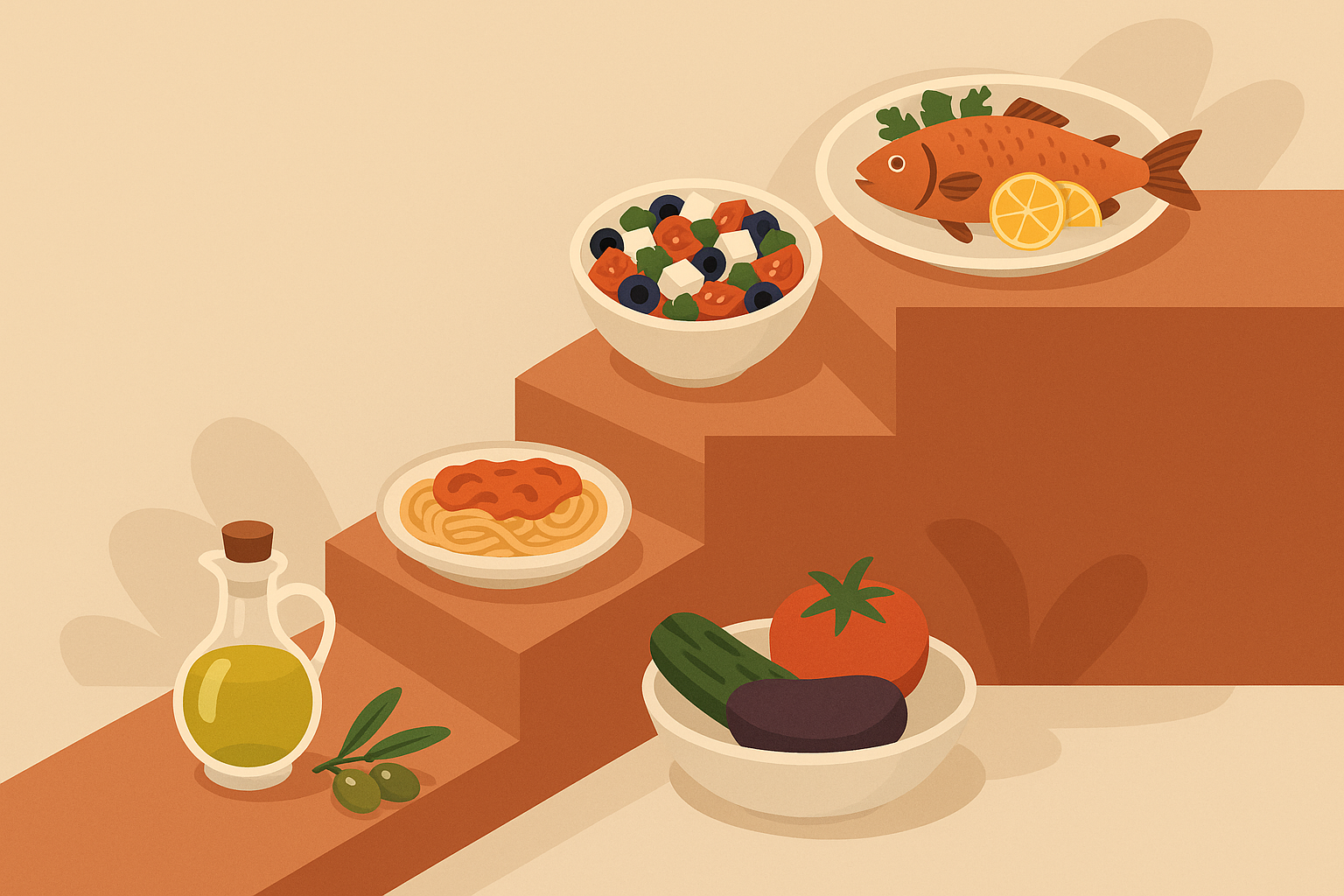
The Mediterranean diet meal plan that sticks is the one that grows with you. Starting simple prevents overwhelm while building momentum. Your Mediterranean diet becomes more sophisticated naturally as you gain experience and confidence.
Success with the Mediterranean diet comes from progressive skill building rather than trying to master everything at once. Each Mediterranean diet meal plan phase prepares you for the next level of complexity and effectiveness.
Phase One: Simple Swaps That Stick
Success starts with replacing just three daily eating habits with Mediterranean alternatives. Week 1: Just swap three things. That’s it. This builds momentum without overwhelming your routine or requiring major lifestyle changes. The goal is establishing core eating patterns that feel natural and sustainable before adding complexity.
These simple changes create a foundation that supports more advanced techniques later while delivering immediate benefits that keep you motivated. Your Mediterranean diet journey begins with small wins that compound over time.
Don’t worry about being perfect. I still eat pizza sometimes, and the Mediterranean police haven’t arrested me yet. The Mediterranean diet doesn’t require a complete lifestyle overhaul from day one. Strategic swaps create positive momentum while your taste buds and habits gradually adapt to Mediterranean flavors and patterns.
Your First Week: Three Strategic Changes
I recommend starting with breakfast, lunch, and evening routine modifications that require zero cooking skills. Replace your usual breakfast cereal with Greek yogurt topped with nuts and honey – this single change stabilizes blood sugar and provides sustained energy.
Swap sandwich bread for whole grain pita with hummus and vegetables for lunch, giving you more nutrients and fiber. End each day with a small portion of olives and lemon-infused water to begin establishing Mediterranean flavor preferences and hydration habits.
This approach focuses on habit formation rather than perfection. Your body begins adapting to Mediterranean foods while your confidence builds through small daily successes.
Mediterranean Starter Checklist:
- Replace breakfast cereal with Greek yogurt + nuts + honey
- Swap sandwich bread for whole grain pita + hummus
- End day with olives and lemon water
- Track energy levels for one week
- Note any digestive changes
- Identify which swap feels most natural
Week Two: Adding Simple Cooking Techniques
Once your basic swaps feel automatic, it’s time to learn fundamental Mediterranean cooking techniques that maximize flavor and nutrition with minimal equipment. Master basic olive oil and herb seasoning combinations – this single skill transforms any vegetable into a Mediterranean-style dish.
Learn simple legume preparation methods that make beans and lentils actually taste good. Challenge yourself to incorporate one new Mediterranean vegetable each week, expanding your palate gradually.

Building cooking confidence happens one technique at a time. Mediterranean cuisine relies on simple methods that enhance natural flavors rather than complicated procedures. Your Mediterranean diet becomes more enjoyable as your cooking skills develop.
Phase Two: Creating Your Personal Sample Plans
Building upon simple habits, you’ll now create personalized sample meal plans that account for your schedule, preferences, and nutritional needs. If you’re cooking for kids who think olives are evil, here’s how to sneak Mediterranean principles into mac and cheese. This phase focuses on developing flexible meal templates that can be adapted based on seasonal availability and your personal energy levels.
You’ll also learn efficient batch preparation strategies that save time without compromising nutritional quality. Batch cooking sounds great until you realize you hate eating the same thing four days in a row. Your Mediterranean diet meal plan becomes a living document that adapts to your changing needs and circumstances.
The best Mediterranean diet meal plan is the one you’ll actually follow consistently. This phase helps you create realistic plans that work with your lifestyle rather than against it.
Weekly Meal Planning Template:
- Identify your three busiest days
- Plan one-pot Mediterranean meals for those days
- Schedule batch prep time (30 minutes max)
- Create backup options for unexpected schedule changes
- Stock pantry with Mediterranean essentials
- Test new recipes on less busy days
Your simple Mediterranean diet meal plan evolves into something more sophisticated as you gain experience. This progression ensures you’re always working at an appropriate challenge level that builds skills without creating overwhelm.
Phase Three: Mastering Advanced Mediterranean Principles
The final phase implements sophisticated Mediterranean meal planning techniques that optimize for maximum health benefits, culinary enjoyment, and lifestyle sustainability. You’ll learn to fine-tune meal combinations for maximum absorption of key nutrients such as antioxidants, omega-3s, and fat-soluble vitamins.
This phase also covers recipe innovation mastery – developing skills to create original Mediterranean-inspired recipes that honor traditional principles while accommodating modern ingredients and techniques. Your Mediterranean diet meal plan becomes a creative expression of your personal health goals and taste preferences.
Advanced Mediterranean diet mastery means understanding the why behind traditional practices so you can adapt them intelligently to modern circumstances. Your Mediterranean recipes become tools for achieving specific health outcomes rather than random meal ideas.
The best Mediterranean diet meal plan at this level is one you’ve customized based on everything you’ve learned about timing, local adaptation, genetic factors, and personal preferences. Your Mediterranean diet becomes a sophisticated system for optimizing health and enjoyment.
Advanced Mediterranean Mastery Checklist:
- Understand nutrient timing and food combining principles
- Master seasonal menu rotation based on local availability
- Develop signature Mediterranean dishes using local ingredients
- Create meal plans that support your specific health goals
- Build a network of local Mediterranean-style food sources
- Teach others your personalized Mediterranean approach
Not everyone can shop at farmers markets or afford fancy olive oil. Good olive oil costs more than vegetable oil. I get it. Start with one bottle and use it sparingly on things that matter. Have you been struggling to make Mediterranean eating work with your busy schedule? Organic Authority’s carefully curated selection of Mediterranean-inspired products can help bridge the gap between your good intentions and daily reality. From high-quality olive oils to organic ancient grains, we’ve done the research to find products that align with both Mediterranean principles and modern convenience needs.
Your simple Mediterranean diet meal plan can incorporate these quality ingredients to ensure you’re getting authentic Mediterranean nutrition even when time is limited. The Mediterranean diet works best when you have access to high-quality ingredients that support your health goals.
Final Thoughts
The Mediterranean diet meal plan that actually works isn’t about copying recipes from coastal Italy or Greece. It’s about understanding the deeper principles behind why this way of eating promotes longevity and vitality, then adapting those principles to your unique body, location, and lifestyle.
Your body’s rhythms, local soil conditions, genetic makeup, and current skill level all influence how successfully you can implement Mediterranean eating patterns. Starting simple with strategic swaps beats overwhelming yourself with complex meal plans you’ll abandon within weeks.
Focus on timing your meals with your body’s natural rhythms, sourcing foods that grow well in your area, and gradually building the skills needed for long-term success. Remember that people in actual Mediterranean countries didn’t follow rigid meal plans – they developed flexible eating patterns that worked with their environment and supported their health goals.
The most important thing? Don’t try to implement everything at once. Choose one element that resonates with you – whether it’s timing your largest meal at midday, finding local alternatives to Mediterranean staples, or simply starting with three daily food swaps.
Build that habit until it feels natural, then add the next layer. This approach might take longer initially, but it creates lasting change that actually improves your health rather than adding stress to your life. Your Mediterranean diet meal plan should enhance your life, not complicate it.
Look, this isn’t about perfection. It’s about finding a way of eating that makes you feel good and doesn’t stress you out. Start small, be patient with yourself, and remember – even the people in actual Mediterranean countries don’t eat perfectly all the time. Some weeks you’ll nail this, others you’ll eat cereal for dinner. Both are fine.

